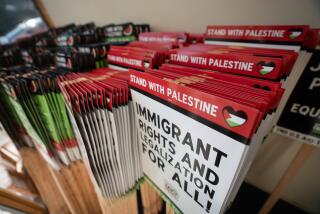Palestinians’ U.N. gamble could backfire
- Share via
It goes without saying that Palestinians and Arabs are outraged by the idea that the United States is threatening to block recognition of a Palestinian state at the United Nations.
What is less obvious, perhaps, is that some of the most vociferous critics of the Palestinian bid for upgraded U.N. recognition are Palestinians themselves. How could it be that advocates of Palestinian rights could be suspicious of, if not altogether opposed to, the U.N. gambit? Isn’t the creation of an internationally recognized independent state the goal shared by all Palestinians?
Not exactly. The Palestinian cause concerns more than merely statehood. And although much depends on how the statehood bid is formally expressed, there is every possibility that U.N. action on the wrong set of terms could be a setback in the Palestinians’ decades-long struggle for self-determination and the right to live normal, dignified lives in their ancestral land.
At the heart of the problem is how “Palestine” might come to be defined in the U.N. The statehood bid probably will be structured along the lines long discussed as the basis for a two-state solution: territory encompassing the 22% of historical Palestine that remained after hundreds of thousands of Palestinians were forced from their homes during the creation of Israel in 1948 — namely, the West Bank, East Jerusalem and the Gaza Strip, which were subsequently captured by Israel in 1967. But that could change who the United Nations considers to be Palestinian and how their rights may be determined, to their profound detriment.
Today, the Palestine Liberation Organization is recognized by the U.N. and most of its member states as the sole legitimate representative of the entire Palestinian people: those living under occupation, those living in Israel and those living in exile or as refugees, who constitute the single largest group of Palestinians. If its place in the international body is taken by a Palestinian state identifying itself with the occupied territories, Palestinians who do not live in those territories — that is, the majority of Palestinians — could lose their representation at the U.N. and be pushed back into the shadowy silence and invisibility from which they fought to emerge in the 1960s. The 1.5 million Palestinians living as second-class citizens of Israel could be left to fend for themselves against legalized discrimination and political repression directed against them as non-Jews in a state whose Jewish identity the Israelis are demanding ever more insistently that the Palestinians acknowledge.
Moreover, an internationally recognized state limited to the shards of Palestine that remained after 1948 would do nothing for the Palestinian right of return to homes and land in what is today Israel, and could in fact gravely threaten the exercise of that right, which is fundamental to the Palestinian cause.
A very broad set of Palestinian rights is already recognized by the U.N. As the Oxford legal scholar Guy Goodwin-Gill notes, the General Assembly has repeatedly emphasized that “the Palestinian people is the principal party to the question of Palestine,” just as it has recognized that the right to self-determination and the right of return to homes and property from which they were displaced inheres in the Palestinians as a people. And U.N. resolutions do not limit the Palestinian people or their rights merely to the territories occupied in 1967; General Assembly Resolution 194, for example, expressly recognizes their right of return to homes in what is now Israel.
It would be profoundly problematic, not to say dangerous, if the Palestinian U.N. bid substituted a very narrow formal recognition — which would mean little practically, given that mere recognition would do nothing to actually end Israel’s ongoing occupation of Palestinian land — for the much broader definition of the Palestinian constituency and the array of Palestinian rights already recognized by the U.N.
These worries are not unfounded if one considers the Palestinian politicians preparing the statehood bid: the venal clique surrounding Mahmoud Abbas, the Palestinian Authority “president” whose term expired almost three years ago. Abbas and his circle are not merely unelected; their party was actually thrown out of office in the last Palestinian elections in 2006.
Shrouded in mystery, their current bid is consistent with the pattern they established during the endless secret negotiations of a two-decade peace process whose only tangible result has been to give them a fleeting taste of power while leading their people deeper and deeper into a morass. Indifferent to the democratic tide sweeping the Arab world, they neither have, nor have they sought, a popular mandate for the gamble they are undertaking. Indeed, many Palestinian observers see the current U.N. gambit as yet another cynical maneuver that has more to do with resuscitating a failed two-state strategy —and Abbas’ own waning political fortunes — than with genuine concern for his people’s inalienable rights.
We are, then, in a moment pregnant with ironies. With its eye on the 2012 elections, the Obama administration intends, as usual, to come to Israel’s rescue at the U.N. But in the act of serving Israel by blocking the expression, however flawed, of legitimate Palestinian aspirations, the U.S. would also inadvertently be thwarting Abbas and company, one of the unpopular and undemocratic regimes it has long propped up throughout the Arab world. And, although it would be doing so for the wrong reasons, by standing in the way of recognizing a state whose contours and purported leadership do nothing to address the rights of most Palestinians, the U.S. might also contribute unwittingly to maintaining the integrity of the Palestinian cause.
Saree Makdisi is a professor of English and comparative literature at UCLA. He is the author of, among other books, “Palestine Inside Out: An Everyday Occupation.”
More to Read
A cure for the common opinion
Get thought-provoking perspectives with our weekly newsletter.
You may occasionally receive promotional content from the Los Angeles Times.






